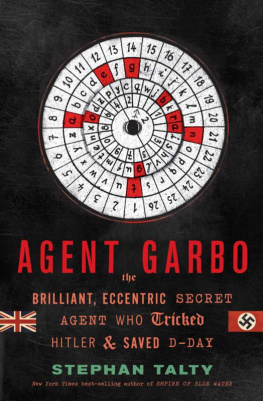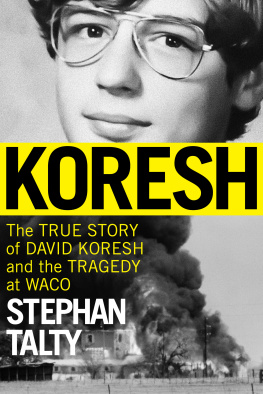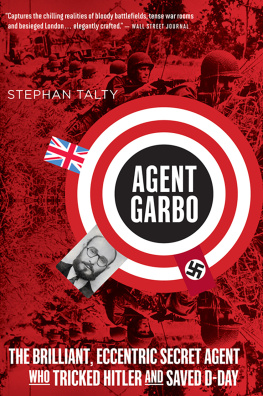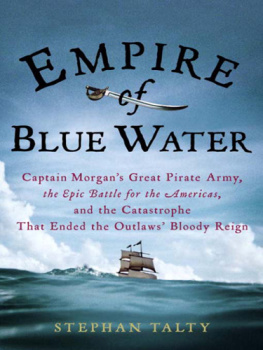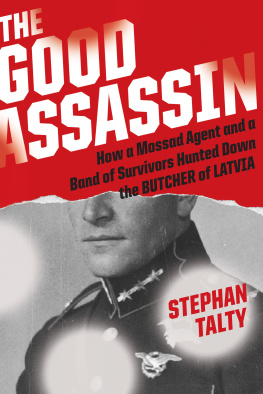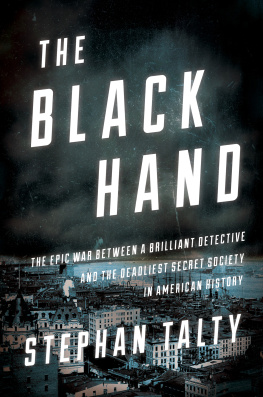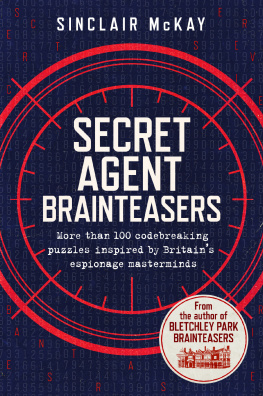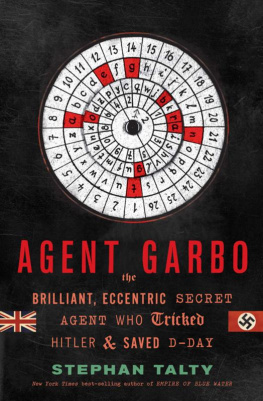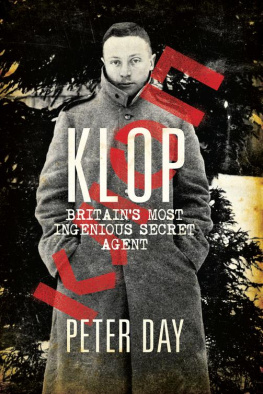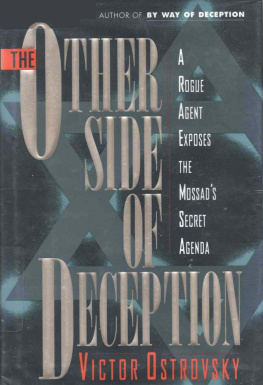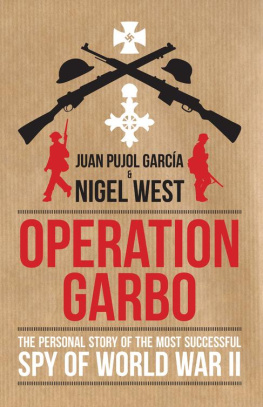Appendix A: Organizations
Abwehr: The German intelligence-gathering organization responsible for human espionage, established in 1921.
BiA: Section within MI5 that ran all the controlled agents in England.
German High Command: The military staff that coordinated the activities of the Luftwaffe, the German navy and the Wehrmacht, the German army.
London Controlling Section: Founded in June 1942, the LCS was an arm of the Joint Planning Staff responsible for the creation of strategic deception policy and planning.
MI5: The British internal counterintelligence and security agency.
MI6: The British Secret Intelligence Service, responsible for foreign intelligence operations.
SD: the Sicherheitsdienst (Secret Service), the intelligence organization of the SS and the Nazi Party.
War Office: The British government office responsible for the administration of the British army.
XX Committee: The organization that supplied information to the double agents in Britain, chaired by J. C. Masterman.
Appendix B: The Garbo Network (Entirely Fictitious)
J (1): Pilot on regular flights between England and Portugal. Garbos courier.
J (2): RAF officer and unconscious collaborator who passed information on rocket batteries in Hyde Park.
J (3): Top official in the Spanish Department of the Ministry of Information. Another unconscious collaborator who was assumed by the Germans to be the real W. B. McCann, head of the Spanish section of the ministry. Perhaps Garbos most essential agent.
J (4): Censor at the Ministry of Information.
J (5): Secretary at the Secretariat of the Ministry of War and Garbos mistress.
No. 1: Portuguese commercial traveler named Carvalho who reported on Devon and Cornwall. A rather colorless individual, somewhat lazy and haphazard in his reports.
No. 2: William Maximilian Gerbers. An Englishman of Swiss-German ancestry who was the source for the Malta convoy report that first revealed Pujols operation to the British.
No. 2 (1): William Gerberss widow, recruited into the network,
used as a radio operator and cutout between Garbo and his agents.
No. 3: University-educated Venezuelan, nicknamed Carlos, and chief deputy of the Garbo network.
No. 3 (1): Noncommissioned officer in the RAF, stationed in
Glasgow. The agent who purchased the aircraft recognition handbook, later baked into a cake by No. 2 (1).
No. 3 (2): Lieutenant in the 49th British Infantry Division, used mainly in Operation Torch.
No. 3 (3): Greek merchant seaman and fervent communist based in Glasgow, used in Operation Fortitude.
No. 4: Fred, a waiter from Gibraltar, essential to the Chislehurst Caves scheme and later used in Fortitude South.
No. 4 (1): Left-leaning technician who helped Garbo obtain a wireless set.
No. 4 (2): Guard in the failed Chislehurst Caves plot and source for No. 4.
No. 4 (3): American NCO, befriended by No. 4 and the source for much of the information on FUSAG.
No. 5: Brother of the Venezuelan student, No. 3, and a restless character who roamed the southern coast of England and Wales before relocating to Canada.
No. 5 (1): Commercial traveler and cousin of No. 5 who passed information on American subjects from his home base in Buffalo.
No. 6: Nicknamed Dick, a South African linguist with strongly anticommunist views. Had to be killed off when his real-world scribe died in a plane crash while traveling from Scotland.
No. 7: Welsh sailor known as Stanley who became head of one of Garbos subnetworks.
No. 7 (1): British soldier in the 9th Armored (Panda) Division who was used during Operation Starkey.
No. 7 (2): Retired Welsh seaman and founder of the Brothers in the Aryan World Order, used extensively in Fortitude South.
No. 7 (3): English secretary of the Brothers in the Aryan World Order who was the lover of No. 7 (4). Later moved to India.
No. 7 (4): Indian poet and Aryan fanatic known as Rags who reported from Brighton during the run-up to D-Day.
No. 7 (5): Welsh employee of a commercial firm who monitored the areas around Taunton and Exeter.
No. 7 (6): Low-grade operative and member of the Welsh fascists who reported from Swansea.
No. 7 (7): Treasurer of the Brothers in the Aryan World Order who sent in military updates from the Harwich area.
Notes
The references to KV, AIR, PRO WO, PRO AIR, HW and WO all refer to files kept at the National Archives at Kew, England.
Introduction
page
xi This damned secrecy thing: George S. Patton, letter to Beatrice Patton, March 6, 1944. Quoted in Patton, p. 421.
xii a living dynamo: Quoted in Ambrose, Eisenhower, p. 88.
He was smoking four packs: DEste, p. 326.
bowed down with worry: McManus, p. 116.
Waiting for him in France: Hesketh, p. 101.
xiii thought to be held as a centrally controlled mobile reserve: Ibid.
slim, elegant little man: Holt, p. 216.
Just keep the Fifteenth Army: Quoted in Holt, p. 579.
xiv the best actor in the world: Pujol and West, p. 120.
xv power-drunk egocentric: Quoted in Ambrose, Eisenhower, p. 52.
I had the idea: Juan Pujol, interview with Josep Espinas, Identities, Catalan TV documentary, date unknown.
the man they called Jesus: Bristow, p. 271.
I wanted to start a personal war: Author interview with Rafael Fraguas.
1. Tom Mix in Barcelona
4 complicit expression in his ironic gaze: Jurez, p. 39.
In my house: Juan Pujol, letter to Tamara Kreisler, May 6, 1988.
I really believed: Ibid.
I was constantly covered: Ibid.
5 That cowboy was doing: Ibid.
The contents of my fevered fantasies: Ibid.
I wanted to be the beloved hero: Ibid.
his nickname was Bullet: Ibid.
I didnt hurt anybody: Juan Pujol, letter to Tamara Kreisler, May 8, 1988.
Punishments and retribution: Ibid.
sturdy and straightforward: Pujol and West, p. 22.
He taught me to respect: Pujol and West, p. 24.
four interminable years: Ibid., p. 23.
6 My imagination would travel with them: Ibid., p. 20.
the leftists idea of a joke: Carr, p. 60.
One day a right-wing faction: Pujol and West, p. 31.
Every morning my father went: Ibid., p. 19.
7 they settled into a magnificent home: Jurez, p. 44.
a hefty fellow of fifteen: Pujol and West, p. 28.
endless and dull: Ibid.
Ive always adored romanticism: Juan Pujol, letter to Tamara Kreisler, May 25, 1988.
8 I was destroyed: Juan Pujol, letter to Tamara Kreisler, August 16, 1988.
he would awaken: Pujol and West, p. 23.
I felt my stubbornness: Ibid.
prudent, very religious: Ibid.
Pujol had learned to ride: Jurez, pp. 4647.
9 Everybody was crying and shouting: Juan Pujol, letter to Tamara Kreisler, August 24, 1988.
The flight of his soul: Pujol and West, p. 29.
10 He was a terrible businessman: Author interview with Juan Kreisler.
I dont know: Juan Pujol, letter to Tamara Kreisler, August 24, 1988.
2. The Training Ground
11 in such a fratricidal fight: Pujol and West, p. 37.
I loved liberty: Juan Pujol, letter to Tamara Kreisler, August 24, 1988.
nothing great has ever been achieved without violence: Carr, p. 13.
12 Every shop and caf had an inscription: Orwell, p. 4.
snatched from certain death: Pujol and West, p. 37.
a brutish appetite: Ibid., p. 94.
A horrible atmosphere of suspicion: Orwell, p. 140.
Trotskyist treachery: Ibid, p. 173.
13 one of many young Spaniards: Thomas, p. 481.
I was petrified: Pujol and West, p. 38.
I kept assuring [them]: Ibid.
14 I had ... become a criminal: Ibid., p. 39.
16 I began to look like a decrepit old man of forty: Ibid., p. 40.

